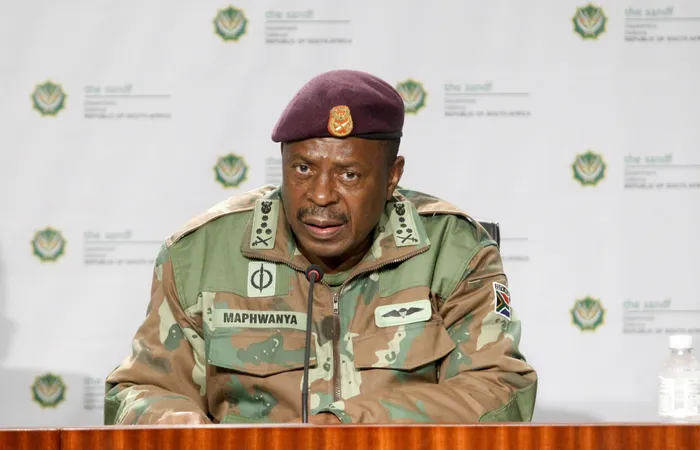SANDF chief in hot water over ‘Iran political solidarity’ remarks

Chief of the South African National Defence Force, General Rudzani Maphwanya, is in hot water after allegedly breaking protocol.
Image: Jacques Naude / Independent Newspapers
UNDER-FIRE South African National Defence Force (SANDF) chief General Rudzani Maphwanya’s visit to Iran was ill-advised, especially at a time of heightened geopolitics including a tense stand-off with the US.
This is according to the Presidency, as Maphwanya continues to face increasing scrutiny following his recent trip to Iran, with questions being raised about his adherence to established foreign policy protocols.
During his visit to Tehran, Iran, Maphwanya reportedly expressed complete political solidarity with the nation.
His controversial remarks have emerged amid existing tensions in South Africa's relationships with key trading partners, particularly the US.
This situation is further complicated by the US having implemented a 30% tariff on South African goods, citing concerns about unfair trade practices.
“The expectation is that the General should have been a lot more circumspect with the comments he makes, which delved into the area of foreign policy which only the president as well as the Department of International Relations and Cooperation (DIRCO) are responsible for.
"We are in the process of managing a very delicate exercise of resetting diplomatic relations with the United States, resetting political relations with the US and more importantly, balancing the trade relationship in such a manner that that trade relationship is mutually beneficial and therefore it is not helpful that when we are in that process of resolving that relationship, you then have senior government or military officials making statements that will further inflame the situation. It is not helpful at all,” said Presidency spokesperson Vincent Magwenya.
Maphwanya's comments have been disavowed by both the DIRCO and the Department of Defence and Military Veterans.
DIRCO spokesperson, Chrispin Phiri, said: “Non-state actors are expressly prohibited from claiming to represent the people of South Africa - a role reserved for elected representatives. The department has maintained that the implementation of South Africa's foreign policy is a presidential function, with DIRCO providing crucial support in this regard.
“Consequently, any statements made by an individual, or a department other than those responsible for foreign policy, should not be misinterpreted as the official position of the South African government.”
Phiri added that International Relations Minister Ronald Lamola “would be seeking further clarification on this matter”.
While details for his visit remain unclear, Maphwanya is said to be "against the ropes" for an apparent disregard of protocol, according to a senior government official close to the Department of Defence.
“I don't think they will fire him as yet because it's not clear if he is in Iran at the behest of the president (Cyril Ramaphosa) or the minister (Angie Motshekga)... He will have to explain himself when he comes back. Both ministries will be awaiting his return,” said the source.
Maphwanya held meetings with several high-ranking Iranian military officials, including Major General Aziz Nasirzadeh, Iran's defence minister; Major General Abdolrahim Mousavi, the chief of staff of the Iranian Armed Forces; and General Amir Hatami, the Iranian army commander.
According to the Tehran Times, Hatami stated that Iran and South Africa share principles of anti-colonialism, anti-arrogance, and justice-seeking. He also emphasised that South Africa holds a "prioritised" position in Iran's foreign policy.
The Department of Defence has also responded to the controversy, with spokesperson Onicca Kwakwa saying: "The Department of Defence and Military Veterans does not make political or policy decisions on international relations," said Defence Ministry spokesperson Onicca Kwakwa.
Kwakwa added that Motshekga will be engaging with Maphwanya on his return.
Cape Times
Related Topics: